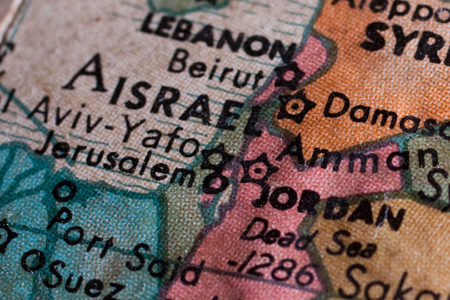The Making of the Diaspora
Hosea 9:1-17
One of the greatest paintings of all time is Michelangelo’s The Last Judgment. The entire work, painted on the altar wall of the Sistine Chapel, reflects the despair of people who are marked for judgment. Though some elements of the painting may be unbiblical, its message reminds us, nevertheless, that God will surely judge those who have rejected His saving grace for a life of sin.
When the sixteenth-century painting was unveiled, a storm of conviction is said to have fallen on the viewers. Later, all Europe reportedly trembled as the work was explained from city to city through pictures.
Hosea also painted a portrait of sorts. His words vividly depicted Israel’s sinful condition. But unlike the people who saw The Last Judgment, the Israelites neither repented nor trembled at the message. Instead, Israel seemed to live in disbelief that judgment would soon destroy her. In chapter 9, God condemned Israel’s degrading practices, which resulted in the withdrawal of His presence and the announcement of the nation’s demise.
Captivity Declared
Hosea sternly reprimanded Israel for paganizing the Feast of Tabernacles. “Rejoice not, O Israel, for joy, like other peoples; for thou hast played the harlot from thy God, thou hast loved a reward upon every threshing floor” (v.1). During the Feast of Tabernacles, Israel attributed its plentiful harvest not to God but to Baal, a Caananite fertility deity, and participated in the licentiousness linked to Baal worship. Prostitutes frequented the threshing floor and the winepress to commit adultery with the men who guarded the grain. These sins involved wild shouting and merrymaking that degraded the character of the Feast of Tabernacles. Israel’s immorality and idolatry would result in God removing future harvests. “The floor and the winepress shall not feed them, and the new wine shall fail in her” (v. 2). This judgment was a direct fulfillment of Moses‘ prophecy before Israel entered the land (Dt. 28:38–42, 51).
Hosea prophesied, “They shall not dwell in the LORD’S land, but Ephraim shall return to Egypt, and they shall eat unclean things in Assyria” (v. 3). The Israelites would not literally return to Egypt but would suffer the same conditions of exile, bondage, slavery, oppression, toil, and sorrow that they experienced there. However, they would be exiled to Assyria, where they would be forced to eat “unclean things.” They had dedicated their harvest to Baal; therefore, the Lord would remove their kosher, sanctified food and make them eat unclean food that had been offered to idols. Israel would dwell in the defiled country of Assyria without a sanctuary, sacrifice, or sanctified food.
During the Assyrian captivity, all their means of worship according to the Levitical Law would be cut off. The wine offerings would cease; and should Israel attempt to offer sacrifices in Assyria, such “sacrifices shall be unto them like the bread of mourners; all that eat of it shall be polluted; for their bread for their soul shall not come into the house of the LORD” (v. 4). God vowed that eating such sacrifices would bring no joy or satisfaction. Instead, they would be like the unclean bread of mourners. Everything mourners touched became unclean because they had touched a dead body (Num. 19:14–15, 22). Mourners’ bread was unclean and unfit to use for worship. Therefore, all who ate of the sacrifice would become polluted as well.
Hosea proceeded to ask Israel a rhetorical question concerning her ability to celebrate the feast while living in exile: “What will ye do in the solemn day, and in the day of the feast of the LORD?” (v. 5). Naturally, Israel’s religious calendar ceased to have significance during her captivity in Assyria. In exile she would be unable to worship. One can only imagine the condemnation the Israelites felt when their appropriate feast days arrived. Eventually Israel’s spiritual life diminished.
Hosea envisioned the great destruction that was soon to fall on Israel. The prophet knew that those who escaped death and captivity during the Assyrian siege would flee to Egypt for refuge. Hosea revealed that “Egypt shall gather them up, Memphis shall bury them” (v. 6). That is, despite their escape to Egypt, they would still experience death and be buried in Memphis. Memphis was the ancient capital of Egypt on the western bank of the Nile and south of old Cairo, where Egypt buried her kings. It was, in fact, in Memphis where the Egyptians buried the Israelites who died. The Israelites who returned to Israel after the Assyrian siege found only wasted cities. Hosea prophesied that “the pleasant places for their silver, nettles shall possess them; thorns shall be in their tabernacles” (v. 6). In other words, all their precious possessions of silver (including idols) had been confiscated; their cities, homes, and places of worship were overgrown with weeds, thorns, and thistles.
Corruption Denounced
Again Hosea enumerated the reasons for judgment. First, he said, “the prophet is a fool, the spiritual man is mad” (v. 7). Some believe this prophecy expresses the people’s response to Hosea and his ministry. Others believe it is Hosea’s condemnation of Israel’s false prophets. Commentators marshal strong arguments for both interpretations. However, the context would indicate that it is Hosea’s prophecy against the false prophets of Israel. The word fool means “insane” and the word spiritual can be interpreted “wind.” In actuality, the phrase says that the words of a false prophet lack substance and are like the wind. Such a one is mad or insane. Second, Hosea said a false prophet is filled with “iniquity, and . . . great hatred” (v. 7). The people harbored extreme bitterness toward Hosea for denouncing their sins and their prophets. It stirred them to hostility and to hold grudges against Hosea and God.
In contrast to Israel’s false prophets, Hosea said, “The watchman of Ephraim was with my God” (v. 8). Some believe that Ephraim is being identified as the watchman of God. But the watchman is Hosea, not Ephraim. Hosea claimed to be the watchman with God, standing on the watchtower and faithfully predicting the coming judgment on the nation. To this statement, the people said, “but the prophet is a snare of a fowler in all his ways, and hatred in the house of his God” (v. 8). Thus Israel, who is called “the house of God,” treated Hosea like a wild beast and continually set a trap in hopes of killing him.
God compares Ephraim’s sin to the brutal gang rape and murder of a Levite’s concubine at Gibeah. “They have deeply corrupted themselves, as in the days of Gibeah” (v. 9). This sin was considered the worst act committed since Israel left Egypt (Jud. 19:30). Hosea claimed that Israel’s deep acts of injustice against God and him fell into the same category as the sin in Gibeah. God did not forget to bring judgment in that instance; nor would He forget now.
The announcement of judgment is then interrupted with a flashback. God recalls the early history of Israel and reflects on the sadness He felt over what the Israelites had become.
I found Israel like grapes in the wilderness; I saw your fathers as the first-ripe in the fig tree at her first time; but they went to Baalpeor, and separated themselves unto that shame, and their abominations were according as they loved (v. 10).
God compares His joy over Israel to that of a weary traveler who finds grapes growing in the desert—something that is totally unlikely. The fathers of the nation were compared to the first ripened figs—the sweetest of all fruit. These metaphors express God’s delight over Israel and His intent to do great things through the nation. But Israel abused her privileged relationship with God and pursued shameful practices of idolatry—described as an abomination.
Children Denied
Israel believed that by practicing pagan fertility rites, she would be guaranteed many children and bountiful crops. But God said,
As for Ephraim, their glory shall fly away like a bird, from the birth, and from the womb, and from the conception. Though they bring up their children, yet will I bereave them. Ephraim is smitten, their root is dried up, they shall bear no fruit; yea, though they bring forth, yet will I slay even the beloved fruit of their womb (v. 11–12, 16).
Israel would lose her prosperity and become barren and sterile as quickly as a bird takes flight. She was a vibrant, fruitful land; but that blessing would be replaced by drought and dried-up crops. Though the women would conceive, their children would die through miscarriages, accidents, and disease.
Hosea compared Ephraim’s fate to that of Tyre. “Ephraim, as I saw Tyre, is planted in a pleasant place, but Ephraim shall bring forth his children to the murderer” (v. 13). God had planned for Israel to become prosperous like the city of Tyre; but like Tyre, immorality and idolatry became her downfall. God would destroy Israel as He did Tyre, and Israel’s children would be murdered during the Assyrian invasion. Knowing that judgment was on the way, Hosea prayed that God would withhold children from Israel. “Give them, O LORD—what wilt thou give? Give them a miscarrying womb and dry breasts” (v. 14). This God did.
Coming Dispersion
God’s tone toward Israel turns to anger:
All their wickedness is in Gilgal; for there I hated them. For the wickedness of their doings I will drive them out of mine house, I will love them no more; all their princes are revolters (v. 15).
It was in Gilgal where Israel practiced immorality and idolatry like an adulterous wife who was unfaithful to her husband. In anger, God removed His protective care from the nation and drove her from His house (the land of Israel). There was no “prince” (leader) in Israel to guide the nation back to God; the leaders had all rebelled against Him.
Israel’s fate was sealed. Hosea said, “My God will cast them away, because they did not hearken unto him; and they shall be wanderers among the nations” (v. 17). God would temporarily cast Israel out of its land and make the Jewish people wander throughout the world for centuries. This 2,700year-old prophecy foretells what we call today the Diaspora—the Jewish dispersion. It explains why the Jewish people are scattered around the globe and why they struggle to return to the land that rightfully belongs to them. What great price this nation has paid for.







